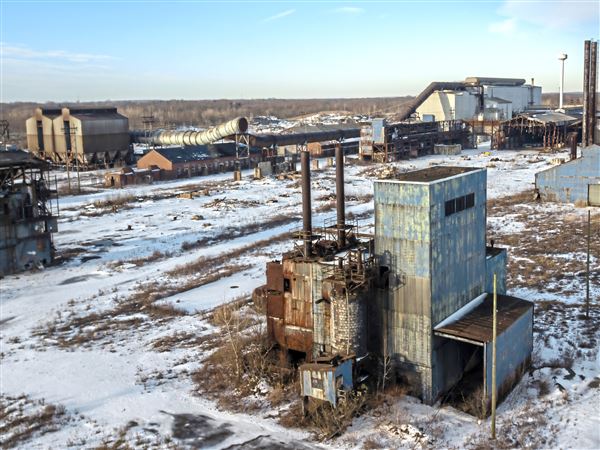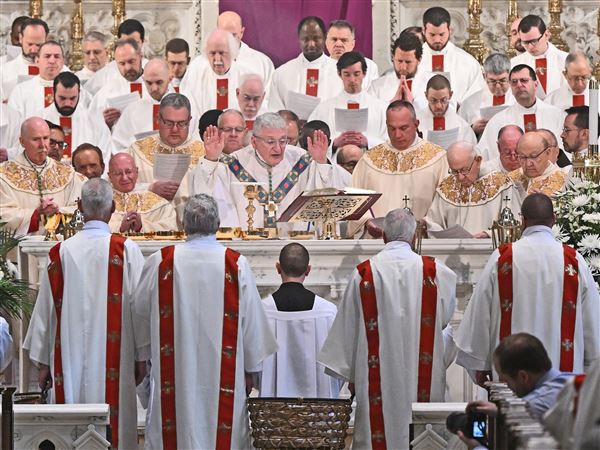
Brooklyn-born businessman Samuel Jemal saw opportunity where others saw a vacant Macy's store in 1996.
Click photo for larger image.
NEWARK, N.J. -- For most of the 20th century, a stately nine-story building near the center of Newark's downtown shopping district housed famous upscale department stores, first Bamberger's and then Macy's.
When Macy's closed in 1992 -- exactly 100 years after clothing merchant Louis Bamberger had opened his store there at Market and Halsey streets -- the building was closed to the public, empty except for a few office workers on the upper floors.
Then in October 1996, Brooklyn-born businessman Samuel Jemal spotted what he saw as an opportunity. He bought the structure and has worked to retrofit it with offices and retail stores that will work in a 21st-century urban terrain.
There are several small clothing shops selling similar products -- athletic shoes, oversized T-shirts, sweatshirts and baggy pants. There's an Old Navy store, a Rite Aid pharmacy and a dozen different telecommunications firms with offices on the upper eight floors.
Now Jemal sees a similar opportunity in Downtown Pittsburgh.
He has a sales agreement to buy the empty, former Lazarus-Macy's department store at Fifth Avenue and Wood Street, in a shopping district that, like Market Street in downtown Newark, was bustling in the early and mid-20th century and is now trying to fight back against suburban malls and adapt to new rules and tastes of urban customers.
The Jemal development in Newark is just one block from where Market and Broad streets cross, the heart of the city's commercial area, which still has a gritty urban pulse on a summer's day. People fill the sidewalks, passing by merchants with carts selling belts, hats, and inexpensive jewelry as the sounds of hip-hop and rhythm and blues music fill the air, emanating from large speakers on the sidewalks.
In an interview, an owner of one of the athletic apparel shops in the Jemal building said he thinks his store will make it.
"This is a good place to do business," said Mohamad Zibara, who runs Blue Jeans II, which has one of the choice locations in the building, facing on Market Street.
Around the corner from Zibara's store, on Halsey, are three other merchants. One of them, dress store owner Alexandra Gosc, doesn't sound quite as optimistic.
She admits it's a drawback that her women's clothing store, which also recently opened, doesn't face on the main drag. She'd been looking for a space a block away on busy Broad Street but couldn't find anything available, so took a space in Jemal's building. It's one of four stores she and her brothers own in the New York City area.
"This is a new store, so it may take a while for customers to get used to it," she said. "I think it's going to work. We're going to make it work."
Jemal doesn't talk much to the news media, and hasn't given many details about his plans in Pittsburgh.
His company, J.J. Operating Corp., is a family-owned developer, now based in Manhattan, that has reopened old, vacant department stores in the Bronx, on Long Island and in Plainfield, N.J., a small community about 15 miles south of Newark. The company got its start when Jemal's father, Isaac, began buying movie theaters in Brooklyn.
The Plainfield building, a two-story brick structure that takes up nearly a block of main street, has a Supremo supermarket, catering to a largely Hispanic clientele, on the first floor, along with a store where nothing costs more than 99 cents; on the second floor is a flea market and food court that operates on weekends.
"We are confident we can attract quality retailers" to the now-closed Lazarus-Macy's on Fifth Avenue in Downtown Pittsburgh, Jemal, president of J.J. Operating Corp., told the Pittsburgh Post-Gazette earlier this week.
Jemal and other company officials must have seen the similarity between the urban location of the old Macy's on Market Street in Newark and the site of the now-closed Lazarus-Macy's store in Pittsburgh.
While the Newark location is bigger and busier than Fifth Avenue in Pittsburgh, both buildings contain parking garages, and the general ambiance of the surrounding area is largely the same. There are shops selling inexpensive jewelry, "we buy gold" outlets, wig shops, urban shoe and basketball shirt stores, check-cashing outlets and hat stores.
Thomas Finley, the assistant manager of the Rite Aid store in Jemal's building, said the store's been open for six years and business is brisk.
"We have good sales. I guess you can't beat a pharmacy. It brings in business," said Finley, who wears his dark hair in long dreadlocks that reach his shoulders. "This whole area is pretty busy. There's even talk about building a hockey arena in Newark. [Pro sports] is the only thing Newark is missing."
Justin Latorre, a 20-year-old sidewalk vendor, said he thinks downtown Newark is better than it was a few years ago.
"Some people still feel it's the ghetto, but I think it's on the uprise," Latorre said.
"I'd say downtown is about 20 percent better than it was 10 years ago," said his friend, Omar Lopez, who works at Newark airport, a 15-minute bus ride from downtown.
The Jemal building is in a key location. Besides being just one block from busy Broad Street, it is three blocks from the Essex County Courthouse and five blocks from the handsome 200-year-old city hall with a circular gold roof. There also are branches of Rutgers and Seton Hall universities, the New Jersey Institute of Technology and an Essex County community college nearby.
One person who's definitely happy about the new life for the old Macy's is Robert Klug, a longtime member of the Operating Engineers union who is the building manager for Jemal.
"This building is a major success story," said Klug, 54, who can remember the old Bambergers/Macy's store from his youth, when he said it was THE place to shop in northern New Jersey and southern New York.
"The store had everything. That's what was so great about it," Klug said. "Mr. Bamberger was way ahead of his time. He brought in inch-and-a-half marble from Tennessee for the floors. He put in huge, chilled wine vaults on the eighth floor, vaults 20 feet high and 150 feet long. Next to the wine vaults were vaults for storing furs.
"He put in conveyer belts and spiral-shaped chutes for packages that went from the upper floors down to the fourth underground storage level. He had truck elevators, big enough to hold 33-foot-long delivery trucks, that were lowered to the fourth level below ground and loaded with packages. All the packages would be funneled down to the fourth basement."
Radio station WOR began broadcasting from the roof of the building in the early 1920s, Klug said. Right next door on Halsey Street is the building where Prudential Insurance began selling "a piece of the rock," he added.
In late 1996, just after Jemal bought the building, Klug was the only worker on the site. He recalled feeling somewhat frightened as he walked through the sprawling, empty floors and is glad that the telecommunications firms such as Verizon, Qwest and others have moved in, along with the retail on the ground floor.
"I can't say enough about the Jemal family," Klug said. "They've treated me very good. We have a mutual respect. They've brought business back to the urban renewal district."
First Published: June 18, 2004, 4:00 a.m.













